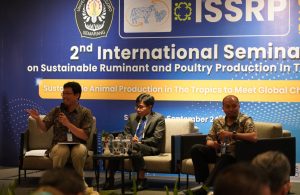Department of Animal Science, Faculty of Animal and Agricultural Sciences, Universitas Diponegoro successfully held the 2nd International Seminar on Sustainable Ruminant and Poultry Production in the Tropics (ISSRP 2025) on Wednesday, September 24, 2025, at the Aruss Hotel Ballroom, Semarang, Central Java. The event was officially opened by the Director of Reputation, Partnership, and Global Connectivity Universitas Diponegoro Prof. Hadiyanto, S.T., M.Sc., Ph.D. The seminar was attended by academics, researchers, students, and industry representatives from Indonesia and abroad.

Asep Setiaji, S.Pt., M.Si., PhD., Chairman of ISSRP, stated that the ISSRP 2025 serves as an important forum in animal science, bringing together international participants to exchange knowledge, share experiences, and build networks. He emphasized that the event aimed to strengthen collaboration and address global challenges in sustainable livestock production. Four keynote speakers from leading universities and research institutions shared their strategic insights on the global challenges of sustainable livestock production, with Prof. Sugiharto, S.Pt., M.Sc., Ph.D., Dean of the Faculty of Animal and Agricultural Sciences, serving as the moderator. The 2nd ISSRP, themed “Sustainable Animal Production in the Tropics to Meet Global Challenges” attracted a total of 147 participants, with international delegates joining us from Malaysia, the United Kingdom, Australia, the United States of America, Pakistan, Nigeria, Libya, East Timor, the Philippines, and Thailand. From within Indonesia, participants are coming from across the archipelago, spanning from Aceh to Maluku
Prof. Dr.agr. Asep Gunawan, S.Pt., M.Sc. (IPB University, Indonesia) highlighted the role of genomics in accelerating the genetic improvement of livestock in tropical environments. He emphasized that advances in molecular breeding, genomic selection, and reproductive biotechnology are crucial for producing ruminants and poultry with better adaptability, higher productivity, and resilience against climate change. Dr. Elham Assadi Soumeh (The University of Queensland, Australia) discussed strategies for enhancing poultry health and welfare under tropical heat stress conditions. She explained that precision feeding, nutritional interventions, and smart housing systems are key approaches to mitigating heat stress, which remains
 one of the greatest challenges in tropical poultry production. Dr. Nazri Nayan (Universiti Putra Malaysia) explored nutritional and management innovations to improve the feed efficiency of ruminants. He pointed out that optimizing dietary formulations and adopting feed additives, such as probiotics, enzymes, and plant extracts, can significantly reduce methane emissions while maintaining the performance of the animals. Prof. Sutaryo, S.Pt., M.Si., Ph (Universitas Diponegoro, Indonesia) presented innovations in waste-to-energy systems for livestock production in this session. He emphasized that integrating biogas technology and circular farming practices can reduce greenhouse gas emissions, improve waste management, and generate renewable energy, thus aligning livestock production with sustainability goals. The keynote sessions underscored the urgent need for knowledge exchange, experience sharing, and collaboration to address the pressing issues of sustainability, climate resilience and global food security.
one of the greatest challenges in tropical poultry production. Dr. Nazri Nayan (Universiti Putra Malaysia) explored nutritional and management innovations to improve the feed efficiency of ruminants. He pointed out that optimizing dietary formulations and adopting feed additives, such as probiotics, enzymes, and plant extracts, can significantly reduce methane emissions while maintaining the performance of the animals. Prof. Sutaryo, S.Pt., M.Si., Ph (Universitas Diponegoro, Indonesia) presented innovations in waste-to-energy systems for livestock production in this session. He emphasized that integrating biogas technology and circular farming practices can reduce greenhouse gas emissions, improve waste management, and generate renewable energy, thus aligning livestock production with sustainability goals. The keynote sessions underscored the urgent need for knowledge exchange, experience sharing, and collaboration to address the pressing issues of sustainability, climate resilience and global food security.
The seminar was supported by leading industry partners, including PT. Berkah Putra Chicken, PT. Tumbuh Optimal Prima, PT. Cimory and Stem Cell and Cancer Research Indonesia, highlighting the strong synergy between academia and industry in promoting sustainable animal production. Through ISSRP 2025, Universitas Diponegoro has reaffirmed its commitment to strengthening international collaboration in animal science, building research-based networks, and developing innovative solutions for the future of sustainable livestock production in the tropics.

